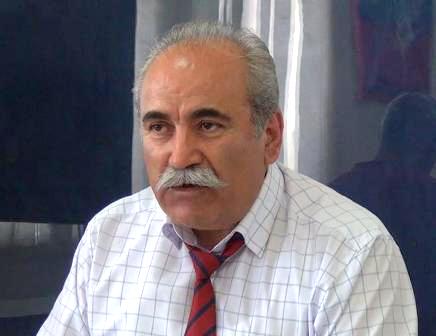 Director and teacher of “Veratsnund” (Renaissance) Armenian Sunday School of Moscow (adjunct to the Embassy of the Republic of Armenia in the Russian Federation), Candidate of Pedagogical Sciences Shoghik Pahlevanyan recently released her book “Collection of Armenian Songs”. On this occasion, Hayern Aysor’s correspondent sat down for an interview with the book’s author.
Director and teacher of “Veratsnund” (Renaissance) Armenian Sunday School of Moscow (adjunct to the Embassy of the Republic of Armenia in the Russian Federation), Candidate of Pedagogical Sciences Shoghik Pahlevanyan recently released her book “Collection of Armenian Songs”. On this occasion, Hayern Aysor’s correspondent sat down for an interview with the book’s author.
Hayern Aysor: Mrs. Pahlevanyan, you recently released your new book entitled “Collection of Armenian Songs”. What made you publish this book? What is the purpose?
Shoghik Pahlevanyan: The idea of publishing the “Collection of Armenian Songs” was conceived a long time ago since teaching a language through songs makes the process of teaching easier and more pleasurable. It also helps students have a solid understanding of the tones and words of a particular language and helps enhance linguistic thinking.
Hayern Aysor: What audience is the book designed for?
Shoghik Pahlevanyan: The book is designed for preschoolers, small school-age children and schoolchildren at the intermediate and higher levels, as well as teachers and those wishing to learn Armenian and examine Armenian songs.
Hayern Aysor: How did you select the songs?
Shoghik Pahlevanyan: This book serves as a wonderful way of helping people learn about Armenian musical culture since it includes 68 Armenian ethnographic songs and the songs of great Armenian composers. I divided the songs into themes and presented the whole picture of Armenian song.
 Hayern Aysor: Mrs. Pahlevanyan, is this your first textbook of Armenian songs?
Hayern Aysor: Mrs. Pahlevanyan, is this your first textbook of Armenian songs?
Shoghik Pahlevanyan: I think this is the first handbook of Armenian songs for Armenians since it features the originals of the songs in Armenian, their translations, the transcriptions and the musical notations of the songs.
Hayern Aysor: How has the feedback been?
Shoghik Pahlevanyan: There have been critiques and many words of appraisal from not only specialists in Armenia, but also teachers of Armenian schools of Russia, and they are all objective.
I have received critiques and opinions from Doctor of Pedagogical Sciences, Professor, Merited Pedagogue of the Republic of Armenia Yuri Yuzbashyan; Doctor of Pedagogical Sciences, Professor Julieta Gyulamiryan; Candidate of Philological Sciences, Associate Professor Ashot Galstyan; Doctor of Philological Sciences, Director of M. Abeghyan Institute of Literature Vardan Devrikyan; Candidate of Pedagogical Sciences, Associate Professor Lilit Ter-Grigoryan, as well as the book’s editor, Candidate of Philological Sciences Lusine Hayriyan and others.
Hayern Aysor: Mrs. Pahlevanyan, alongside this book, you have also been holding Accelerated Armenian Language Courses, which are part of the “Ari Tun” Program. What experience have you gained throughout all these years?
Shoghik Pahlevanyan: I must say that working with the young Armenians visiting Armenia through the “Ari Tun” Program has been very interesting. During their short stay, I have to instill in them the love for the Armenian language, and that love can grow in the future.
At the same time, these courses helped me become convinced that the methodical benchmark of my textbooks (“Russian-Armenian Conversational Book”, “Russian-English-Armenian Conversational Book”, Collection of Armenian Songs”, etc.) is right, and this helps accelerate the process of teaching the Armenian language.







